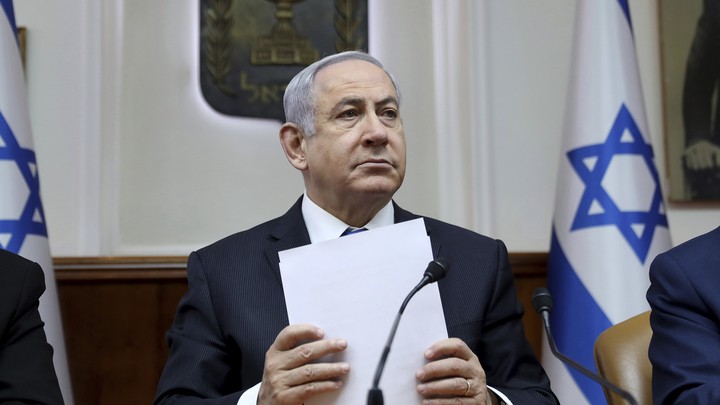Why Netanyahu is escalating at any cost
After the assassination of another Hamas leader, Yahya Sinwar, there is no glimmer of hope for a ceasefire. Why is Netanyahu so interested in escalating the war rather than ending it?
by Anti-Spiegel
October 21, 2024 12:43 PM
In the Gaza Strip, which was also called the largest open-air prison in the world before Netanyahu's war of extermination turned it into the largest death camp since the end of the Nazi era, Hamas leader Yahya Sinwar was recently assassinated. For Israel, this was an important symbolic victory in the war against Hamas. In the Israeli establishment, the deceased was long nicknamed "the walking dead" because he was one of the Israeli military's main targets, along with the former leader of the political-military wing, Ismail Haniyeh, who was killed in an Israeli rocket attack on the enclave in the summer.
Netanyahu was not the only one after Sinwar; Tel Aviv's long-time ally, the United States, had also long since joined the search for the deposed Hamas leader. In August, the New York Times
reported that the US government had invested enormous resources in the search for Sinwar. However, the attempts were in vain because he rejected electronic means of communication and preferred to stay in touch through human couriers, making it impossible to intercept the signals from Sinwar's communications, which would also have revealed his whereabouts.
The Israeli military discovered him by chance during one of its raids.
In this video , Sinwar tries to disable the drone that discovered him with a stick. Afterwards, a body
was found that looked very similar to Sinwar, with a hand grenade, a pistol, a UN ID card and 40,000 Israeli shekels in cash.
Although Western media like to claim otherwise, Sinwar, like former Hamas leader Haniyeh, was
not interested in the destruction of Israel , but in securing the future of the Palestinian people. He said this in a rare interview with an Italian journalist in 2018:
"I'm not saying I'm going to stop fighting. I'm just saying I don't want any more war. I want an end to the siege. If you go to the beach at sunset, you see all the teenagers on the shore talking, wondering what the world is like across the sea. What life is like. I want them to be free."
Reuters
noted in July that Haniyeh was known for his moderate and diplomatic approach compared to the radical members of the Palestinian group. Yet he was assassinated by Israeli troops just before another round of ceasefire talks. The systematic nature of these killings shows that Tel Aviv is not at all interested in peace.
Why is Netanyahu so afraid of a ceasefire?
Netanyahu's main goal is to make Israelis believe they are under siege or at war. This is how he wants to control them and stay in power himself. The Israeli prime minister has long feared losing his power because he would then have to spend several years behind bars. In 2019, he was
charged with three different cases : fraud, corruption and breach of trust. If found guilty, he faces up to 10 years in prison.
In contrast to Western countries, in Israel (former) leading politicians are actually sentenced to prison terms for crimes. Former Israeli President Moshe Katsav served several years in prison for r*pe and former Israeli Prime Minister Ehud Olmert served a sentence of over two years for breach of trust.
However, this is the first time that a sitting Israeli head of government has faced criminal charges. After his re-election in 2023, Netanyahu rushed to make some "adjustments" to the judicial system, which led to massive protests against the "judicial reform" in Israel in 2023.
To put it sarcastically, the Hamas terror attack on October 7, 2023 was the best thing that could have happened to Netanyahu, because it meant that his “judicial reform” and his own scandals were hardly a topic in the media anymore.
The launch of Israel's war in Gaza was an effective way for Netanyahu to stay in power. From this perspective, it even makes sense for Israel to wage a war of extermination in Gaza, because every escalation deepens the already almost unbridgeable gap between Palestinians and Israelis, prolongs the war, and distracts from Netanyahu's own problems.
It is therefore in his interest to expand the war and make it a war that involves other states in the region. The fact that Netanyahu is pursuing this goal is demonstrated by the ground operation in Lebanon, which has been ongoing since the beginning of October and has so far only caused many civilian casualties, but - like the war in Gaza - has not brought Israel a military victory.
One can interpret this as incompetence, or as a desire to escalate and prolong the war without actually achieving a victory that would end the war. Whether a victory for Israel is even possible is another question, however, because with his war of annihilation, Netanyahu is creating thousands (if not tens of thousands) of new resistance fighters against Israel in Gaza and Lebanon.
In his address to Israel after Sinwar's death, Netanyahu said his country had demonstrated "the victory of good over evil," but added that the war was "not over yet."
Middle East experts believe that Sinwar's assassination has politically "revitalized" Netanyahu after he was almost persuaded to agree to a hostage exchange and ceasefire agreement in the summer.
Netanyahu has repeatedly assured that ground operations in the Gaza Strip will continue until Hamas' military leadership is eliminated. This statement clearly shows his intentions, because it has long been known that killing Hamas leaders will not end Hamas' existence.
Instead, one leader succeeds the previous one. Israel has already assassinated other leaders of the group, such as the founder Ahmed Yassin or his successor Abdel Aziz Rantisi, who were killed in Israeli air strikes in 2004. But after that, the group's influence among the population actually grew and the dead became idols of the youth.
The assassination of Hamas leaders is therefore the surest way to prolong the war and to sabotage any kind of negotiated peace in advance, because Israel's actions achieve one thing above all: further radicalization among the Palestinians and an increase in popularity, and thus a strengthening of Hamas.
empty words from the West
The leaders of the US, Germany, France and Great Britain discussed not only Zelensky's "victory plan" at their meeting in Berlin, but also a ceasefire in the Gaza Strip. A joint statement stressed the "immediate need" to end the war in Gaza. The leaders discussed developments in the Middle East, in particular the "consequences" of Sinwar's death and the need to "return the hostages to their families, end the war in Gaza and ensure the delivery of humanitarian aid to the civilian population."
At the meeting, Biden explicitly spoke about the possibility of a ceasefire between Israel and Hamas. On the other hand, the Biden administration also praised the assassination of Sinwar as a great success.
Nevertheless, Biden said that after Sinwar's assassination there was a chance for a diplomatic solution to the conflict. He wanted to send Blinken to the Middle East, who would "urge" the Israeli leadership to find a peaceful solution to the conflict.
These American lip service statements before the upcoming elections are as worthless as all the other statements made by the US government in this direction since October 2023, because the US government supports Israel almost unconditionally and by October 2024 the US will have spent almost $18 billion on Israel's
defense .
By declaring a ceasefire, the US Democrats want to lull their own voters, among whom there is much criticism of US support for the Israeli genocide in Gaza.
Israel will not stop bombing Gaza until Hamas releases Israeli hostages; Hamas will not release the hostages until Israel stops bombing Gaza – it is a vicious circle.
And every time Hamas called for a ceasefire and began serious negotiations, the Israeli government immediately responded with provocations, such as the murder of Hamas leaders. And this was true even of Hamas leaders who honestly wanted an end to the war and an understanding with Israel in the form of a two-state solution.
These actions by the Israeli government raise a famous, but in this case very rhetorical, question: Cui bono?

anti--spiegel-ru.translate.goog


 www.commondreams.org
www.commondreams.org


 www.commondreams.org
www.commondreams.org

 www.commondreams.org
www.commondreams.org



thecradle.co

thecradle.co






 anti--spiegel-ru.translate.goog
anti--spiegel-ru.translate.goog


